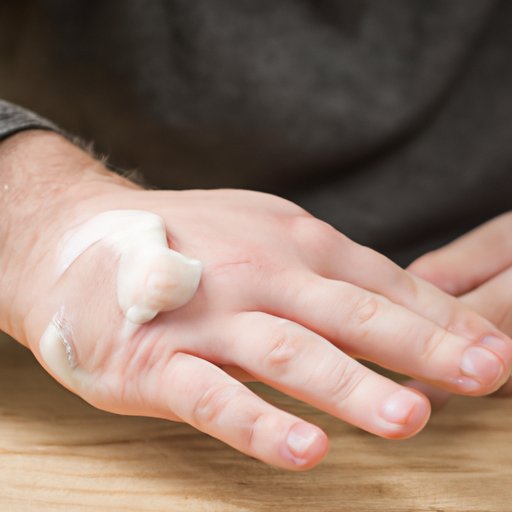
How to Get Rid of Ringworm Permanently: A Comprehensive Guide
Ringworm is a highly contagious fungal infection that can be quite annoying and unsightly. It can affect various parts of the body, including the scalp, feet, and groin. If you have been struggling with ringworm, you are probably searching for an effective solution that can help you get rid of it for good. In this comprehensive guide, we will explore various remedies and preventive measures that can help you deal with ringworm effectively.
Natural Remedies
Natural remedies are a popular choice when it comes to treating ringworm. They are generally safe, affordable, and effective in many cases. One of the biggest benefits of natural remedies is that they do not have harsh chemicals that can trigger side effects.
Some of the common natural remedies for ringworm include:
- Tea tree oil: It has antibacterial and anti-inflammatory properties that help eliminate the fungus.
- Aloe vera: It has soothing properties that help reduce irritation and inflammation caused by ringworm.
- Garlic: It has antifungal properties that help kill the fungus causing ringworm.
- Coconut oil: It has antifungal properties that help prevent the growth and spread of the fungus.
- Vinegar: It has acidic properties that help create an unfavorable environment for the fungus.
To use natural remedies, apply the treatment directly on the affected area. Make sure that you are not allergic to any of the ingredients before using them. Also, avoid using excessive amounts of the treatment as it could lead to skin irritation.
Antifungal Creams
Antifungal creams are one of the most common treatments for ringworm. They work by inhibiting the growth of the fungus, and some of them can also eliminate the fungus entirely.
Some of the best antifungal creams include:
- Clotrimazole
- Tolnaftate
- Miconazole
- Ketoconazole
When using over-the-counter antifungal creams, make sure to follow the instructions carefully. If you are not sure which cream is best for you, consult a pharmacist or a healthcare provider. Avoid using antifungal creams for an extended period as they could trigger side effects such as skin irritation and allergic reactions.
Medications
Prescription medications are usually reserved for severe cases of ringworm that do not respond to other treatments. The most commonly prescribed medication for ringworm is Griseofulvin.
Griseofulvin works by inhibiting the growth of the fungus and gradually eliminating it from the body. However, it can take up to two months for the fungus to be completely removed from the body. Griseofulvin is generally safe, but it can trigger side effects such as skin rashes, headaches, and nausea.
If you are taking Griseofulvin, make sure to follow the instructions carefully to avoid complications. If you experience any side effects, contact your healthcare provider immediately.
Cleaning and Disinfecting
Ringworm is highly contagious, and it can spread easily through contact with infected items. It is, therefore, essential to clean and disinfect your living space regularly.
Some of the tips for cleaning and disinfecting include:
- Vacuuming and dusting regularly to remove any loose spores.
- Washing clothes, towels, and beddings with hot water and detergent.
- Cleaning surfaces with disinfectants such as bleach.
Pay special attention to hotspots in your living space, such as bathroom floors, shower curtains, and doorknobs. These areas are more likely to harbor the fungus.
Proper Hygiene
Good hygiene is crucial in preventing the spread of ringworm. Some of the habits people should incorporate into their daily routines include:
- Showering daily with soap and water.
- Avoiding sharing personal items such as towels, combs, and hairbrushes.
- Avoiding contact with infected individuals.
Hand washing is another crucial aspect of proper hygiene in preventing the spread of ringworm. Wash your hands frequently with soap and water, especially after touching potentially infected areas.
Diet
What you eat can also play a role in preventing ringworm. A healthy diet rich in anti-inflammatory and antioxidant-rich foods can help boost immunity and prevent fungal infections.
Some of the foods that are good for preventing ringworm include:
- Garlic: It has antibacterial and antifungal properties that help fight fungal infections.
- Yogurt: It contains probiotics, which help boost immunity and prevent fungal infections.
- Green leafy vegetables: They are rich in anti-inflammatory properties and antioxidants that help prevent infections.
- Nuts and seeds: They contain healthy fats that are good for the skin and immune system.
It is also important to stay hydrated by drinking plenty of water and fluids throughout the day. Hydration helps flush out toxins from the body and boost immunity.
Prevention
Avoiding ringworm in the first place is the best approach. Some of the tips for preventing ringworm include:
- Avoiding contact with infected individuals or animals.
- Not sharing personal items such as towels, combs, and hairbrushes.
- Keeping your skin clean and dry.
- Avoiding walking barefoot in public areas such as locker rooms and swimming pools.
If you suspect that you have come into contact with the fungus, seek medical attention immediately.
Conclusion
Ringworm is an annoying and unsightly fungal infection, but it can be treated and prevented with the right approach. Whether you choose natural remedies, antifungal creams, or prescription medications, it is crucial to follow the instructions carefully and seek medical attention if necessary.
Remember to keep your living space clean, practice good hygiene, and maintain a healthy diet to boost immunity and prevent future infections. By following these preventive measures, you can enjoy a ringworm-free life.




